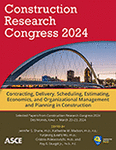Line of Privity’s Effect on Project Performance: A Case Study
Publication: Construction Research Congress 2024
ABSTRACT
The construction industry relies on temporary alliances for project completion, emphasizing effective coordination and communication. Line of privity (LoP) is a key concept in construction projects, representing the contractual relationship between parties and playing a vital role in inter-team coordination. This study investigates the impact of LoP on team communication and productivity within a transaction cost framework, using mixed methods with social network analysis. The main hypothesis posits that contractual and organizational ties, measured by LoP and distance, enhance project team productivity through improved communication. Data were collected from a healthcare project using mixed methods throughout project delivery. Analysis reveals the importance of direct communication, although excessive focus may hinder performance due to fewer parties involved or information overload. Increased organizational distance negatively affects completion rates, while frequent long-distance communication promotes understanding and coordination among distributed teams. A direct correlation between the ratio of LoP communications and project performance was observed. This paper provides insights for construction project management, emphasizing the significance of direct communication, effective management of organizational distance, fostering long-distance communication for distributed teams, and understanding the impact of LoP communications on project performance. These findings contribute to efficient coordination, reduced idle time, and minimized rework.
Get full access to this article
View all available purchase options and get full access to this chapter.
REFERENCES
Ashworth, A., and Perera, S. (2018). Contractual procedures in the construction industry. Routledge.
Garcia, A. J., Mollaoglu-Korkmaz, S., and Miller, V. D. (2014). “Progress loops in interorganizational project teams: An IPD case.” In Construction Research Congress 2014: Construction in a Global Network (pp. 2011–2020).
Gimenez, J. (2006). “Embedded business emails: Meeting new demands in international business communication.” English for Specific purposes, 25(2), 154–172.
Guerra, B. C., and Leite, F. (2020). “Bridging the gap between engineering and construction 3D models in support of advanced work packaging.” Journal of Legal Affairs and Dispute Resolution in Engineering and Construction, 12(3), 04520029.
Lederach, J. (2015). Little book of conflict transformation: Clear articulation of the guiding principles by a pioneer in the field. Simon and Schuster.
Saavedra, R., Earley, P. C., and Van Dyne, L. (1993). “Complex interdependence in task-performing groups.” Journal of applied psychology, 78(1), 61.
Walker, A., and Wing, C. K. (1999). “The relationship between construction project management theory and transaction cost economics.” Engineering, Construction and Architectural Management, 6(2), 166–176.
Williamson, O. E. (1989). Transaction cost economics. Handbook of industrial organization, 1, 135–182.
Winch, G. (1989). “The construction firm and the construction project: a transaction cost approach.” Construction Management and Economics, 7(4), 331–345.
Zhao, D., Duva, M., Mollaoglu, S., Frank, K., Garcia, A., and Tait, J. (2021). “Integrative collaboration in fragmented project organizations: Network perspective.” Journal of Construction Engineering and Management, 147(10), 04021115.
Zulch, B. G. (2014). “Communication: The foundation of project management.” Procedia Technology, 16, 1000–1009.
Information & Authors
Information
Published In
History
Published online: Mar 18, 2024
Authors
Metrics & Citations
Metrics
Citations
Download citation
If you have the appropriate software installed, you can download article citation data to the citation manager of your choice. Simply select your manager software from the list below and click Download.
